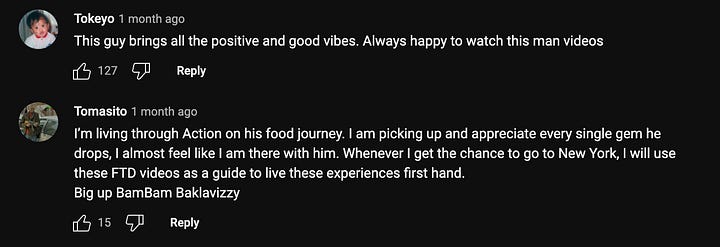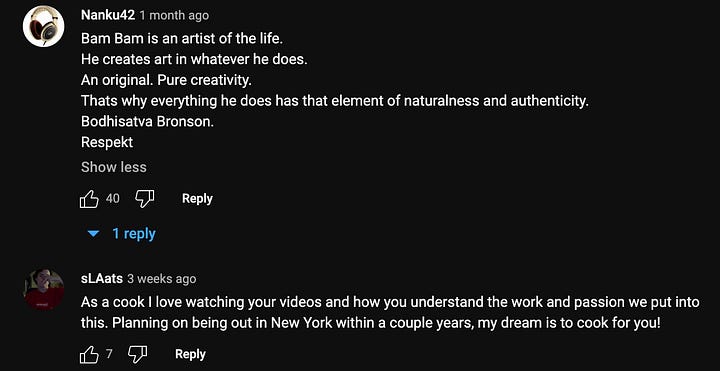Action Bronson's Contradictory Cacophony
The New York rapper's multifarious music offers a uniquely direct opportunity to consider one of the central tensions within the hip-hop genre.

Action Bronson has captivated hip-hop audiences with his colourful storytelling and bombastic style since his independently released debut album, ‘Dr. Lecter’ in 2011. Bronson’s winding, psychedelic narratives are as contradictory as they are entertaining, making him a fascinating emblem of a broader tension within hip-hop, where the spirit of resistance often dovetails with hypermasculine authoritarianism. The Flushing, Queens-born former chef turned rapper and food television host with a larger than life character has earned a cult following with his rhymes revolving around—among other things—food, weed, and women. But there is another throughline in his music, often unconsciously received by fans, which speaks to a larger, more profound theme: the creation of a better world.
In Action Bronson’s music, he articulates a world that sounds superior to the one we actually live in. His lyrics are replete with boastful fantasies about opulent living and unconventional characters. The luxuries that Bronson raps about are markedly different from those which most rappers have ingrained into popular consciousness. Where the Lil Babys of the industry brag of Maybachs with stars in the ceiling and watches flooded with diamonds, Bronson is more inclined to highlight his no-doors Jeep (“No doors on my jeep, That’s the case, I had to jump out / And Stacey Dash on police”) or red leather jacket (“How we celebrate? Went to 125 and bought a red leather”).
This may seem like a trivial difference between choices in car and accessory. But with these lines and countless others, Bronson is weaving a rich tapestry wherein adventurousness and preparedness for anything (say, a rainy New York morning or a spontaneous police chase) are celebrated, instead of empty symbols of material wealth. Bronson combines his more rustic and earthly possessions with an appreciation of life’s elemental pleasures: delicious food (“Go 80 layers on the baklava, that’s handmade by my Nonna”) and drink (“Don’t drink gin and tonic, only natural wine to be honest”). In doing so, Bronson defies the aesthetic sparsity of modern rap flexes (where a now-common refrain involves not even being able to tell the time with your diamond-laden watch) by crafting gloats that texture the surreal, spontaneous lifestyle he lives out on his records.
Bronson’s lyrics often emphasise the merit of self-advancement and the pride of artistic creation (“Just did my first scene with De Niro, just did my first scene with Scorsese”). The internal value system of Bronson’s music suggests that listeners should focus on the pleasures of life and achieving their dreams through the spirit of dedication and creativity. This suggestion and “lived example” that Bronson personifies is visible everywhere around his work. A quick look in the comments of his YouTube videos exploring the vast culinary delights of New York City reveals how passionately Bronson’s fans have embraced his ethic.




But Action Bronson’s fantasy world is not solely centred on material abundance–it places significance on individual personalities and self-actualisation in the face of deprivation. If Bronson’s boasts are somewhat niche to listeners, his storytelling will be more familiar. At the heart of Action Bronson’s semi-fictional stories are the “street characters” he creates. These individuals, often involved in crime, reflect the paradoxical freedom experienced by those on the fringes of society. While it is implicit that these characters would not be “acceptable” in other social spheres, Bronson finds cause to celebrate them.
Take for instance “Thug Love Story 2012” from the original ‘Blue Chips’ mixtape of the same year. The track features production from Party Supplies, the viciously underrated Brooklyn-based duo who Bronson recruited for both Blue Chips tapes. It opens with a transportive sample of “I Only Have Eyes for You” by The Complexions, drawn from the soundtrack of the 1993 film, A BRONX TALE. Immediately, the doo-wop refrains put you on a smoky boardwalk somewhere in the underbelly of New York City, where the story takes place.
Bronson constructs a vivid, semi-fictional narrative around a love interest who had the “sweetest scent [he] ever smelt a woman have”. This woman has drifted into a life of crime in rebellion against her genteel, middle-class Jewish father (who employs a Jamaican maid), which Bronson duly recognises has driven her into sex work out of economic necessity. Noting that being bought and sold as a commodity for male consumption has left her a “crooked orphan”, Bronson rides a breathtaking beat switch into a declaration of his enduring love for this woman (“so many unfamiliar faces that have come and gone, you’re a constant, fucked you in the school closet”). Imbuing the song with an empathetic historiography of the woman’s life in connection to broader social phenomena encourages listeners to view such characters as complex individuals, rather than one-dimensional stereotypes. At the same time, Bronson’s irreverent humour brings levity to a dire situation without totally undermining the gravity of their experiences.
Party Supplies introduces a new sample of “Rose-Marie” by Slim Whitman who sings “of all the Queens that ever lived, I choose you” to bring home the definitive nature of this love in the life of the character Bronson is embodying. Shockingly, this intense romance rapidly escalates into criminality, including domestic violence. By the end of an exhausting and delinquent odyssey, spanning everything from bar fights to penis enlargement surgery, Bronson raps “nowadays you catch the hooker sniffing coke in the shed / It’s a damn shame, I’m just chilling eating lamb brain / I keep the Weiner on display for the campaign”. What appears merely to encapsulate an embittered turn from loving to uncompassionate disregard typical of abusers, also evokes the sexting scandal of former Democratic US House of Representatives member, Anthony Weiner.
Invoking the case of a state representative (who was eventually convicted for an offence in relation to sexting a 15-year-old girl) at the death of the song is an electric choice. By connecting the exploitation of women in the sex industry with the pernicious sexism practised at and promulgated by those at the very top of “respectable” society, Bronson inverts the story’s focus on the criminality of the poor. Bronson’s music is teeming with momentary but incisive references to the worlds of politics, sport, underworld crime, and more. The result is a catalogue of music that demonstrates a rare, witty engagement with all spheres of society, with no pretension toward any of the characters involved.
Simultaneously, these stories almost always reproduce and therefore work to reinforce certain prejudices and oppressions that pervade capitalist society–particularly sharply within Bronson’s chosen corner of it. No song demonstrates this better than “Consensual Rape”, which amounts to mindless bile, where Bronson brags about a sexual “fantasy” that relies on eroticising real, brutal sexual violence against women.
In 2016, student activists at George Washington University protested a scheduled performance by Action Bronson in opposition to songs like “Consensual Rape” and transphobic social media incidents. It is eminently reasonable for left wing students to protest violent misogyny and anti-gay and trans bigotry at any time. But especially so during the rise of Donald Trump’s overtly fascistic MAGA movement, of which glorifying sexual violence against women and hatred of LGBTQI people remain key pillars. Crucially, this is one part of a global phenomenon in far-right politics that has only accelerated since the 2016 US Presidential election. The university cancelled the performance, prompting Bronson to respond with a remorseful statement. The statement is sincere enough by the standard of celebrity apologies, but notably, it includes the standard “it’s just storytelling” defence. As we have seen, there is a difference between a thoughtful fable around oppression and a crass reenactment.
Indeed, there is a political incongruity between Action Bronson's lyrics that demean women and queer people, and his carefree spirit and conception of a better world. On one hand, his music presents a utopian vision of a world free from repression and material limitations where individuals can express themselves freely and pursue their dreams. On the other, a non-trivial amount of his lyrics perpetuate aggressive sexism and homophobia and thus it is not enough to tout these songs as righteous, defiant artworks.
Importantly, Bronson himself makes clear that he isn’t exactly removed from these people, their tales, or the social ills within (“King Thrust is what they call me at the hooker house, 260 pounds of pressure right in a hooker’s mouth”), so it would be equally facile to insist he is straightforwardly focused on furthering stigmatisation. His representations of street life are also about a society that values creativity, individuality, and self-expression. He champions the underdogs, outcasts and eccentrics, giving voice to those who are often ignored or dismissed. His lyrics celebrate the power of imagination and the importance of personal authenticity. While these characters represent a certain freedom from social expectations of society, they are always tightly bound by the limitations of poverty and the criminal activity they engage in to make ends meet. They wear every expected pathology of those afflicted by the worst social ills of capitalism (“Cindy, she not herself unless she smoking crack”).
This creates a tension between the desire for individual freedom and the systemic inequalities that limit that freedom. These people and their stories would not exist in the fantasy world that Action Bronson creates, as to generalise such a state of abundance and leisure, there would need to be no private property and therefore, no poverty and no resultant necessity to sell drugs or sex for survival. While these tales may seem like mere escapism, comedic effect or even vessels for bigotry, when combined with the overall vision Bronson advances in his music, they reveal a deeper desire for a world without the deprivation and distortions created by capitalist property and social relations. In such a world, where we share in the abundance Bronson individually narrates, eccentrics could be unleashed, free to enrich our collective lives with their quirks and rightfully celebrated for their multitudes.
At his best, Action Bronson weaves together his experiences of street life with his utopic visions to create slick and captivating lyrics (“At times my only friends in life are drugs and the cannoli”), accentuated by glamorous production. In his music, his fans find a vision of a life free from the material and social limitations that often hold them back, giving them hope for a better future. At his worst, Bronson can be lazy and careless, stepping on those who have clearly inspired him, reproducing the oppression that is both necessary to maintain capitalist society today and a fetter to realising Bronson’s grand visions.
But perhaps what is most fascinating about Bronson’s work is that, more often than not, these two tendencies cannot be separated from one another–they appear on the very same songs and projects (just listen to any of the songs discussed in this article). This circular self-negation where Bronson grapples with the gulf between his utopia and harsh, dystopic reality makes his music one of the most contradictory, compelling cacophonies to grace hip-hop. This tension is not solely a refuge for his personal bigotry but—intentionally or not—also a potential site of transformation. By codifying the perversions of our society within his artistic oeuvre that imagines a world that is better, freer, and more just, Action Bronson’s music is a negation of his self-negation.
To the discerning listener, it is unmistakably clear which aspects of Action Bronson’s lyrics “fit” within his fantasy world, and which are discordant. These inconsistencies do not disqualify him. On the contrary, the unique fidelity of these contradictions demonstrate the need for more artists like Bronson who, through genuine engagement with both reality and fantasy, can at once mindfully and unintentionally reveal biting truths—and the constraints of even the most thrilling speculative art.
Note: Special thanks to my friend Reece Hooker for his contributions to this piece, namely his indelible editing and music journalism expertise.

